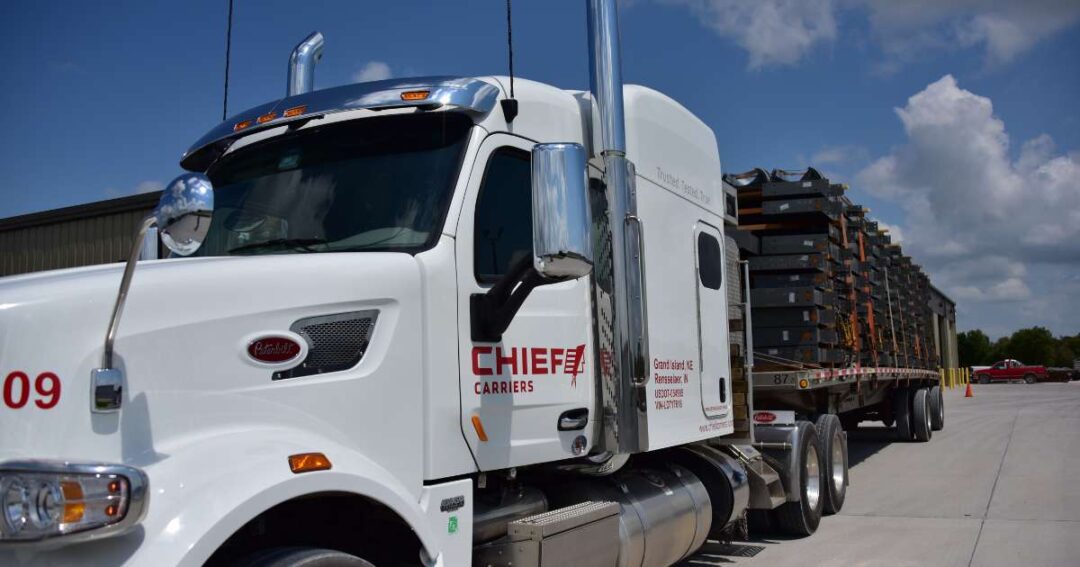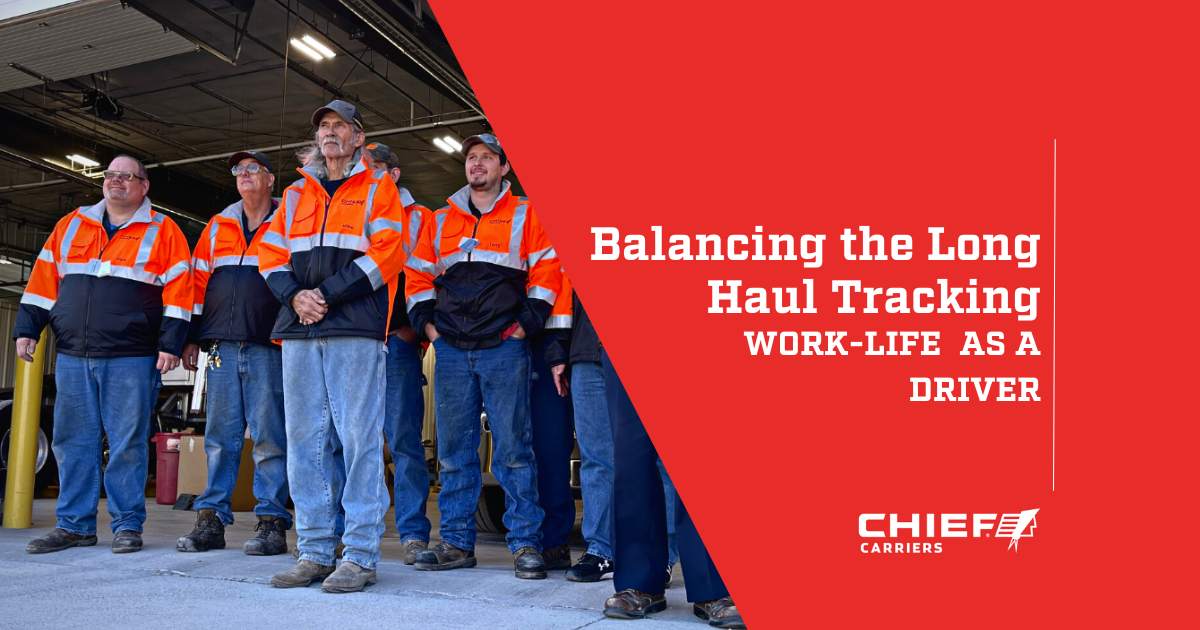Long Haul Trucking: How to Achieve Work-Life Harmony as a Driver
Are you struggling to find the perfect balance between your job and family life?
As a trucker, it can be challenging to juggle long hours on the road and quality time with your loved ones. On this episode of Driven Too Far, Andrew shares his expert advice on how truckers can achieve a healthy balance between their schedules, paychecks, and relationships with their spouse.
Hello and welcome back to our dedicated followers and newcomers alike to the blog extension of “Driven Too Far: The Truth About Trucking” podcast. I’m Andrew Winkler, your guide on this journey through the multifaceted world of trucking.
Today, we’re diving into a topic that hits close to home for many of us on the road: “Finding Work-Life Harmony as a Truck Driver.”
In this podcast episode, we steered away from the often-used term “work-life balance” and chose “harmony” instead. Why? Because the life of a trucker is rarely a 50/50 split between work and home.

What is Work-Life Harmony?
It’s about creating a symphony where each part of your life complements the other, even if they’re not equally distributed. This topic isn’t just crucial; it’s a lifeline for truckers and their families, aiming to bridge the gap between the demanding hours on the road and the precious moments at home.
As someone who’s been in the driver’s seat, I’ve felt the tug-of-war between making a living and living a life. The road calls with the promise of a paycheck, while home whispers of missed milestones and family dinners. It’s a delicate dance, one that I, like many of you, have struggled to master.
This blog post will peel back the layers of this challenge, offering practical advice and deeper insights for both rookie drivers and seasoned road veterans. How do you keep your wheels turning without losing track of what’s waiting for you back home?
So, as we shift gears from our podcast to this blog, let’s ponder this: Is it really possible to harmonize the rhythm of the road with the melody of home life? Let’s explore this together.
Income Needs and Trucking Realities
Trucking, for many, is not just a career choice but a path to financial stability.
The allure of trucking’s income potential is undeniable. With the possibility of earning upwards of $100,000 a year, it’s no wonder that the driver’s seat beckons to many seeking a substantial paycheck.
However, the reality of trucking extends beyond the attractive figures on a paycheck. It’s a demanding lifestyle, where long hours on the road are the norm and time away from family becomes a significant trade-off. This aspect of trucking is often overshadowed by the glowing income prospects.
The balance between earning a good living and spending time with family is a tightrope that every trucker walks. The more time you spend on the road, the better your earning potential, but this often comes at the cost of missed family moments and milestones.
It’s a constant juggling act, trying to meet financial needs while also being present for loved ones.

The Importance of Pre-Planning and Communication for Work-Life Harmony
Before one even steps foot into the cab of a truck, a crucial step needs to be taken – open and honest discussions with family. Embarking on a trucking career is not a decision to be made in isolation; it’s a life choice that affects every member of a trucker’s family. These conversations are fundamental in setting the stage for what lies ahead – a lifestyle that involves long periods away from home and significant adjustments for the entire family unit.
The need for continuous communication cannot be overstressed. As truckers navigate the unpredictable roads of their profession, keeping the lines of communication open with family is vital. It’s not just about checking in; it’s about sharing experiences, discussing challenges, and managing expectations from both ends.
Effective communication goes beyond mere updates about one’s whereabouts. It involves talking about the emotional and practical impacts of the job, understanding the sacrifices involved, and jointly navigating the complexities of a trucking lifestyle.
This ongoing dialogue helps in aligning family life with the realities of trucking, ensuring that everyone’s needs and concerns are acknowledged and addressed.
Dealing with Irregularities in Income
The trucking profession, while potentially lucrative, is often characterized by fluctuating income. Truckers face the challenge of irregular earnings due to factors like seasonality, unpredictable freight demands, and varying distances of hauls.
These fluctuations can make financial planning complex and stressful, especially when trying to maintain a consistent standard of living.
One effective strategy for managing this unpredictability is to seek out guaranteed pay programs offered by some trucking companies. These programs provide a stable base pay, ensuring that truckers have a predictable income regardless of the miles driven or loads carried in a given week.
This financial stability can be a game-changer, especially for those who have families relying on a steady income.
Another approach is careful personal financial planning.
Truckers can smooth out income inconsistencies by creating a budget that accounts for the ebbs and flows of their earnings. Building a savings buffer during peak earning periods can provide a cushion during leaner times.
This proactive approach requires discipline but can significantly reduce the stress associated with income irregularities, allowing truckers to focus on their job and family without the constant worry of financial instability.

The Impact of Being Away from Home
The absence of a trucker from home profoundly impacts family dynamics. The spouse often assumes a dual role, managing the household and parenting responsibilities alone, akin to a single parent.
This shift can lead to increased stress and responsibility for the spouse, as they juggle work, childcare, household tasks, and sometimes unexpected emergencies single-handedly.
One way to manage these challenges is through thorough planning and delegation. This might include organizing schedules well in advance, setting up systems for household management, and perhaps enlisting help from extended family or community resources.
It’s crucial for truckers to acknowledge and appreciate the added burden their absence places on their partners and actively participate in this planning process, even from afar.
Regular and meaningful communication is key in supporting the spouse back home. This involves not just checking in, but actively listening to their challenges and providing emotional support.
Truckers can also contribute to decision-making and problem-solving discussions, ensuring they remain an integral part of the family dynamic despite their physical absence. This collaborative approach helps in maintaining a sense of unity and partnership, crucial for the well-being of the family.

Financial Planning and Savings
One inspiring example of effective financial management in trucking is the story of Dan, a fellow trucker. Dan recognized early in his career the importance of financial discipline.
He and his spouse made concerted efforts to save and plan, even if it meant embracing a frugal lifestyle initially, including preparing meals in advance and avoiding unnecessary expenses on the road.
Dan’s approach to savings was both simple and effective. He focused on building a financial cushion, understanding that trucking income can be unpredictable.
This savings buffer allowed him to navigate the lean periods without undue stress, knowing his basic financial needs were covered. His commitment to this plan led to a significant savings account, providing both financial security and peace of mind.
The story of Dan highlights a critical lesson for all truckers: the importance of savings and financial planning. It’s not just about earning; it’s about managing those earnings wisely to ensure long-term stability and security.
Truckers are advised to adopt a savings plan, budget effectively, and make informed financial decisions. This approach not only secures their financial future but also alleviates the stress associated with income irregularities, allowing them to focus more on their job and family life.

Family Needs and Adjusting Work Schedules
Ongoing discussions about family needs are essential in the life of a trucker. As families grow and evolve, their needs change, necessitating a reevaluation of work schedules and commitments.
It’s important for truckers to regularly engage in open conversations with their families to understand these changing dynamics and adjust their schedules accordingly.
What to Talk About?
Negotiating with employers for flexible schedules can be a crucial step in addressing these evolving family needs.
Many trucking companies are becoming increasingly aware of the importance of work-life harmony and are willing to discuss flexible scheduling options. Truckers should feel empowered to have open conversations with their dispatchers or managers about adjusting their schedules to better accommodate significant family events or changing circumstances at home.
By actively seeking a balance that honors both their professional commitments and family life, truckers can contribute to a more harmonious and fulfilling life. This approach requires communication, understanding, and sometimes compromise, but it leads to a more sustainable and satisfying career in trucking.
It’s about finding a rhythm that works not just for the trucker but for their entire family.

Psychological Impact on Drivers
The trucking profession, while rewarding, can take a significant emotional and mental toll on drivers. Long hours of solitude on the road, coupled with the stress of being away from loved ones, can lead to feelings of isolation and guilt.
These emotions are compounded by the pressure of maintaining safety on the road and meeting tight delivery schedules.
My personal experience underscores the psychological impact of trucking.
Early in my career, I found myself grappling with the guilt of missing important family events and the constant worry about their well-being while I was away. This internal struggle was a silent battle, often overshadowed by the daily demands of the job.
How Does Therapy Help?
The importance of open communication in mitigating these psychological challenges cannot be overstated. I learned the hard way that keeping these feelings bottled up only intensified them.
By sharing my struggles with family and fellow truckers, I found understanding and support, which was crucial in managing these emotional challenges.
It’s vital for truckers to have an outlet for their feelings and to know they are not alone in this journey.
Regular, honest conversations with loved ones and peers can provide much-needed emotional relief and a sense of connection despite the physical distance.

Balancing Long Haul Trucking the Right Way
In our journey today, we’ve explored the multifaceted world of trucking, exploring the intricate balance between professional demands and personal life.
We discussed the allure and realities of trucking’s income potential, the critical importance of pre-planning and ongoing communication with family, and the challenges of fluctuating income.
We also touched upon the significant impact of a trucker’s absence on family dynamics, the importance of savings and financial planning, the necessity of adapting work schedules to evolving family needs, and the often-overlooked psychological impact on drivers.
This exploration underscores the concept of harmony over balance in trucking. It’s not about dividing your time equally but about finding a rhythm that allows both your career and your family life to flourish together.
Remember, achieving harmony is a continuous journey filled with learning and adjustments along the way.

Keep Listening and Get More Long Haul Trucking Tips
For a more in-depth exploration of these topics and to hear more stories from the road, I invite you to listen to the full episode of “Driven Too Far: The Truth About Trucking.” You can find it on our website, as well as on Spotify, Apple Podcasts, and YouTube. Each episode is designed to give you the insights and advice you need to navigate the trucking industry’s challenges.
As we conclude this exploration of finding work-life harmony in trucking, remember that each journey is unique, filled with its own challenges and triumphs.
Keep these insights and strategies in mind as you navigate the roads ahead, both literally and metaphorically. Your resilience and adaptability are key in mastering this delicate balance.
Safe travels and may the road rise up to meet you in your journey towards harmony in both work and life.
Andrew Winkler
Andrew Winkler is the only executive in the trucking industry willing to get in the cab and listen to you. He started out in the driver’s seat like you–loving a life on the road, missing a family at home, and yelling at dispatch over the phone. He knows how it feels to be driven too far, which is why he’s giving you the truth about trucking so you can have both your family and your career.
Interested in having Andrew Winkler appear as a guest on your show? Have a show topic idea? Want to appear as a guest on Driven Too Far? Have a question?

